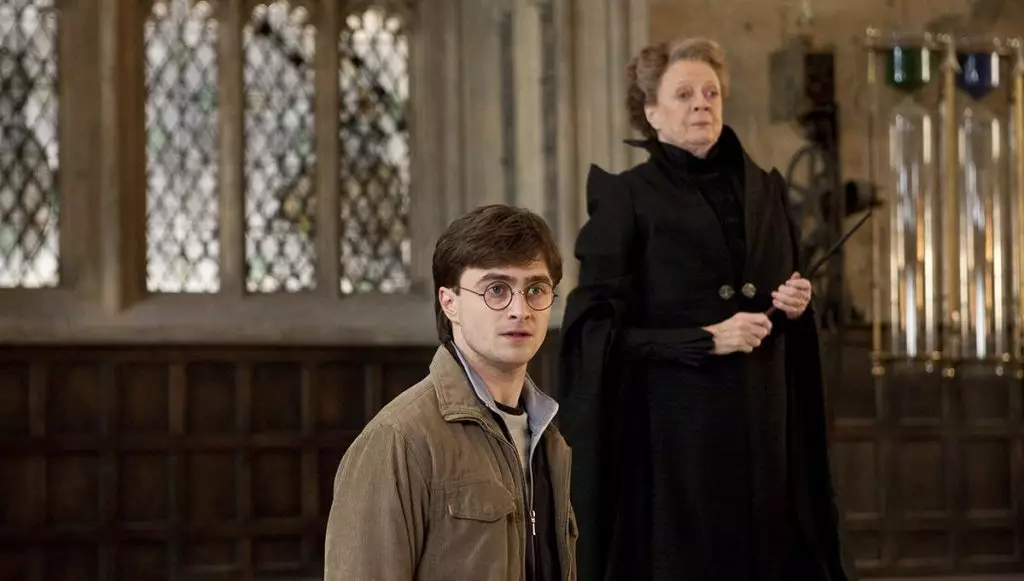The entertainment world lost a truly remarkable talent with the passing of Dame Maggie Smith at the age of 89. Best known for her roles in “Harry Potter” and “Downton Abbey,” Smith was not just an actress; she was a cultural icon, winning the admiration of both audiences and fellow actors alike. As tributes pour in from the cast of the “Harry Potter” films, it is clear that her impact reverberated far beyond her impressive body of work. The heartfelt messages from her colleagues illustrate the profound connections she forged throughout her career—connections characterized by mutual respect, admiration, and love.
Daniel Radcliffe, who played the titular character in the “Harry Potter” franchise, shared a touching recollection of their first encounter. He met Smith at the tender age of nine during a read-through for “David Copperfield.” Despite his youth, Radcliffe recognized the significance of working alongside a revered Dame—a status that further elevated Smith in the eyes of younger generations. He fondly recalls how she immediately put him at ease, allowing him to experience not just her formidable talent but also her warmth and kindness, qualities often overshadowed by her fierce intellectualism and sharp wit.
Radcliffe’s candid recollections emphasize that Smith was not only a mentor but also a joy to be around. He encapsulates the essence of what made Smith so special: her ability to charm and intimidate in equal measure. For him, she was not just a talented actress but an integral part of his formative years in the industry, a person who contributed to his growth both as an actor and as an individual.
The tributes continued with Bonnie Wright, who portrayed Ginny Weasley. Her post on Instagram served as a poignant reminder of Smith’s powerful presence as the head of Gryffindor House, a character who she infused with both sass and maternal warmth. Wright’s nostalgia for shared moments, especially during the filming of the Yule Ball scene, illustrates how deeply Smith’s character resonated with fans and cast members alike. The ability to blend authority with kindness is a rare trait, but Smith’s portrayal of Professor McGonagall encapsulated that duality perfectly.
Emma Watson’s tribute further illuminates Smith’s lasting impact. Reflecting on her youth and the gradual appreciation that came with maturing, Watson highlights how she initially underestimated the depth of Smith’s legacy. The candid nature of her tribute shows how Smith not only held her own among a predominately male faculty in the Hogwarts universe but also inspired young actresses like Watson to recognize their worth and strength in an industry often marred by inequality.
The emotional outpouring from these young stars underscores the multi-generational influence Smith possessed. Not only did she capture hearts on-screen, but she also shaped the sentiments of those who shared the stage and screen with her, leaving an indelible mark on their careers. It is a testament to her stature in the industry that, despite her passing, she continues to inspire and mentor even from beyond the grave.
In reflecting upon her career, it is essential to acknowledge Smith’s ability to bring complex and nuanced characters to life. Her versatility allowed her to take on various roles, each demanding a different facet of her talent, from comedic relief to formidable authority figures. This fluidity in her performances ensured that she remained a beloved figure across generations.
As we say our final goodbyes to Maggie Smith, we must hold onto the legacy of joy, resilience, and kindness she leaves behind. Her contributions to cinema and television enriched our culture, making her more than just an actress; she became an enduring symbol of excellence in the performing arts. To her family, friends, and all those touched by her work, the sentiments of gratitude resonate deeply in this moment of mourning. Dame Maggie Smith will forever be remembered not only for her astonishing talent but also for the light and laughter she shared with everyone fortunate enough to know her. Thank you, Maggie.

Leave a Reply